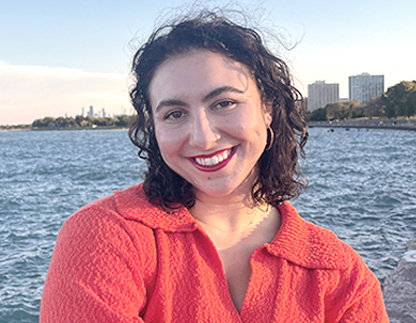Many people are living their lives after experiences of incredible harm and violence. I feel that the meaning of my life is to work toward preventing that.”
Maya Novak-Herzog
PhD Candidate in the Department of Political Science

Maya Novak-Herzog is a PhD candidate in the Department of Political Science in the Weinberg College of Arts and Sciences. Her research questions why institutional sexual violence prevention efforts, like Title IX, have struggled to reduce sexual violence. Maya’s work examines how people understand sexual consent and why these perceptions often don’t align with policy. She is a fellow with the Brady Scholars Program in Ethics and Civic Life, and the Mellon Cluster in Gender and Sexuality Studies.
How would you describe your research and/or work to a non-academic audience?
At a high level, I am curious about why institutional attempts at sexual violence prevention (for example, Title IX) have been mostly ineffective at decreasing overall rates of sexual violence. My dissertation looks specifically at the factors that influence how and what people think about sexual consent and how these understandings are often not reflected in policy.
Tell us what inspired your research and/or work.
In my first year of college at UC Santa Cruz, I stumbled upon a tiny annex of the main health center called SHOP, which served exclusively as a sexual health center. For four years, I worked there as a peer-to-peer HIV test counselor and sexual violence prevention advocate. As a sexual violence prevention advocate, I provided in-person mandatory sexual violence education to all incoming freshmen. I did not know this at the time, but the training we provided was mandated by Title IX. Even then, I could sense something was off—the script we used to teach consent and sexual violence didn’t seem to match how students actually understood these issues.
This gap became even more clear through my work as an HIV tester, where I heard all kinds of stories: women getting tested after finding out their partners had cheated, freshmen boys exploring their sexuality for the first time, and people with little to no sex ed (or abstinence-based education like I received in rural Colorado) terrified they’d gotten HIV from something like kissing.
The stories that stuck with me most were those about consent violations—people looking for the wrong warning signs, not stepping in when friends were in danger, or saying yes when they really meant no. And the ones most affected were, of course, vulnerable groups such as women of color, trans folks, people who grew up in poverty, and those from rural areas. These stories have stayed with me throughout my research, shaping my dissertation and current book project, which focuses on thinking about consent differently to better inform policy, training and public perception.
What is the biggest potential impact or implication of your work?
I hope my research does two things:
First, that it expands the ways that people think about consent. Consent is not a box that needs to be checked off –– it is an intimate way of communicating and seeing another person.
Second, I hope that my work can inspire institutional changes. Understanding and incorporating the many nuances of consent into training, education, even policy, is messy work. But many people, particularly women, are living their lives after experiences of incredible harm and violence. I feel that the meaning of my life is to work towards preventing that.
What did you originally want to be when you grew up?
A teacher. In elementary school my teachers would write students’ names on the blackboard under a "good list" and a "bad list." I was always on the bad list, and I wanted to be in charge of those lists when I grew up.
How do you unwind after a long day?
Racquetball! Nine months ago, after seeing those empty courts at the NU gym for four years, I decided to rent a racquet and try them out for myself. This summer I competed in my first tournament.
What inspires you?
My students here at Northwestern and at the School of the Art Institute of Chicago. I have learned so much from them!
Publish Date: October 8, 2024
If you know a graduate student, postdoctoral scholar, graduate faculty member, staff member, or a member of our TGS alumni population who would make a great candidate for our TGS Spotlight Series, please complete this brief TGS Spotlight Series Nomination Form.